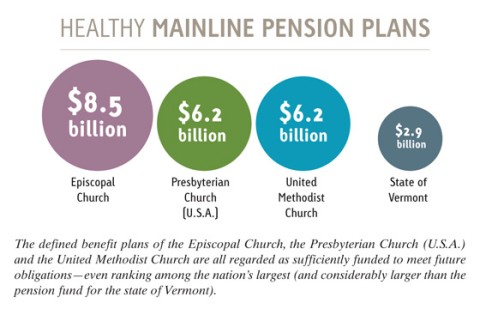Shaky economy imperils church pensions

Religious denominations have long provided retired clergy and staff
with secure pension payments--more secure, in some cases, than corporate
retirement plans. But some recent developments have drawn attention to
the vulnerabilities of so-called church plans, which are exempt from
federal regulations aimed at safeguarding retirement funds for
private-sector retirees.
As cash-strapped states and private
companies revamp, freeze or end their pension programs altogether,
participants in church plans are now realizing that such plans can be
riskier than they appear, observers say.
"As a group, employees in
so-called church plans are far more at risk than other private sector
employees," said Karen Ferguson, director of the Pension Rights Center, a
Washington-based watchdog group.
Unlike other private-sector
workers whose pensions are insured by the federal Pension Benefit
Guaranty Corporation, church employees have no federal agency poised to
rescue their employer-provided pensions in the event of a devastating
market crash. Yet "because there hasn't been a collapse of a [church]
pension board plan, everybody, I think, is comfortable leaving them
alone," Ferguson said. In several recent cases, however, churches have
failed to keep their plans fully funded to be able to meet obligations
to retirees:
Read our latest issue or browse back issues.
- In October, the Roman
Catholic Diocese of Wilmington (Delaware) said it had only $8.5 million
available to pay $52 million in pension liabilities. The diocese, which
is under Chapter 11 bankruptcy protection because of the clergy sexual
abuse scandal, is assuring pensioners that it will meet its obligations. -
In August, the Archdiocese of Boston informed employees that their
pension plan--funded at just 79 percent--is "unsustainable." The
archdiocese will keep paying its obligations, according to spokesman
Terrence Donilon, but a new market-based plan involving 401(k) or 403b
accounts will take effect January 1, 2012, funded through individual and
employer contributions. - About 12,000 Lutherans are seeing
their pension payments shrink by 6 to 9 percent annually from 2010
through 2012. The defined benefit program of the Evangelical Lutheran
Church in America was only 61 percent funded in February 2009 and has
been closed to new participants since January 1, 2010.
Other
major denominations are reporting no such problems with their benefit
plans. Several mainline denominations still offer defined benefit
programs--increasingly rare in the private sector--which promise to pay
retirees a fixed monthly sum based on a formula.
Defined benefit
plans of the Episcopal Church ($8.5 billion), the Presbyterian Church
(U.S.A.) ($6.2 billion) and the United Methodist Church ($6.2 billion)
are all sufficiently funded to meet future obligations, according to
church spokespeople. Those three denominational pension funds rank among
the nation's largest, each of them more than twice the size of
Vermont's $2.9 billion state pension fund, for example.
Unconvinced
that they should follow the lead of corporate America and offer more
plans like a 401(k), the organizations overseeing these assets remain
committed to offering defined benefits.
"We maintain a prudent,
long-term, disciplined and measured investment strategy, and remain
convinced that this approach is the most prudent for achieving positive
long-term investment results," said Colette Nies, spokeswoman for the
United Methodist Church's General Board of Pension and Health Benefits,
in an e-mail.
Observers cautioned church pensioners not to get lulled into a false sense of security.
"The
church world tended to be a place that wanted, in the case of clergy,
to protect those people from ordination to grave," said David Powell, a
Washington attorney and church pension expert who's written the only
book on the subject. "They wanted to make those sorts of pension
promises. It's the affordability of them that has got many of them
concerned now."
Powell said some denominations are considering
switching from defined benefits to less-expensive defined contribution
plans, such as those used by the ELCA and the American Baptist Churches
USA. In the meantime, however, their assurances of sufficient funding
don't necessarily mean much in Powell's view.
"A lot of this is
rather fuzzy accounting," Powell said. "You're really trying to guess:
how much money do I need now in order to pay Joe Blow $110 per month,
commencing in 2030? . . . Actuaries will give you different assumptions,
and it can vary very widely."
Pension concerns have been brewing
in some denominations since before stock markets crashed in 2008. The
ELCA, for instance, is battling a lawsuit from retirees of its
publishing arm, Augsburg Fortress. At a December 8 federal court hearing
in Minneapolis, lawyers sparred over whether the ELCA owes a debt to
Augsburg Fortress pensioners, whose plan was dissolved a year ago after
years of underfunding. A ruling on preliminary questions is expected in
early 2011.
Church plans could qualify for federal insurance if
they were to comply voluntarily with associated federal regulations,
according to Pension Rights Center spokeswoman Nancy Hwa. But few if
any have taken that step.
The PRC's Ferguson said pension funds
of major denominations are managed professionally, and she has no reason
to think they might be in trouble. But because church plans don't have
to disclose their funding levels to the public, a funding crisis could
potentially go undetected.
"Most people don't realize there's a
problem" until they discover that their pensions are in jeopardy,
Ferguson said. "They don't know their plans are not protected by the
law. . . . You assume everything is going to be all right, especially if
you're in a religious organization. You assume that the church is going
to look out for you."
Denominational pension boards send out
annual reports to the likes of Les Pettit, a disabled 67-year-old United
Methodist minister who retired in Berwick, Maine, two years ago after
25 years in parish ministry. To him, the annual report isn't very
illuminating.
"You'd have to be an accountant to understand it,"
Pettit said, adding that he has "great confidence" in those overseeing
his pension funds but admits he's taking their word for it. "It's fine
as far as I know now, but who knows?" Pettit said. "You put your trust
in [managers and administrators]. Then you hope and pray they're as
honest as they claim to be." -RNS






